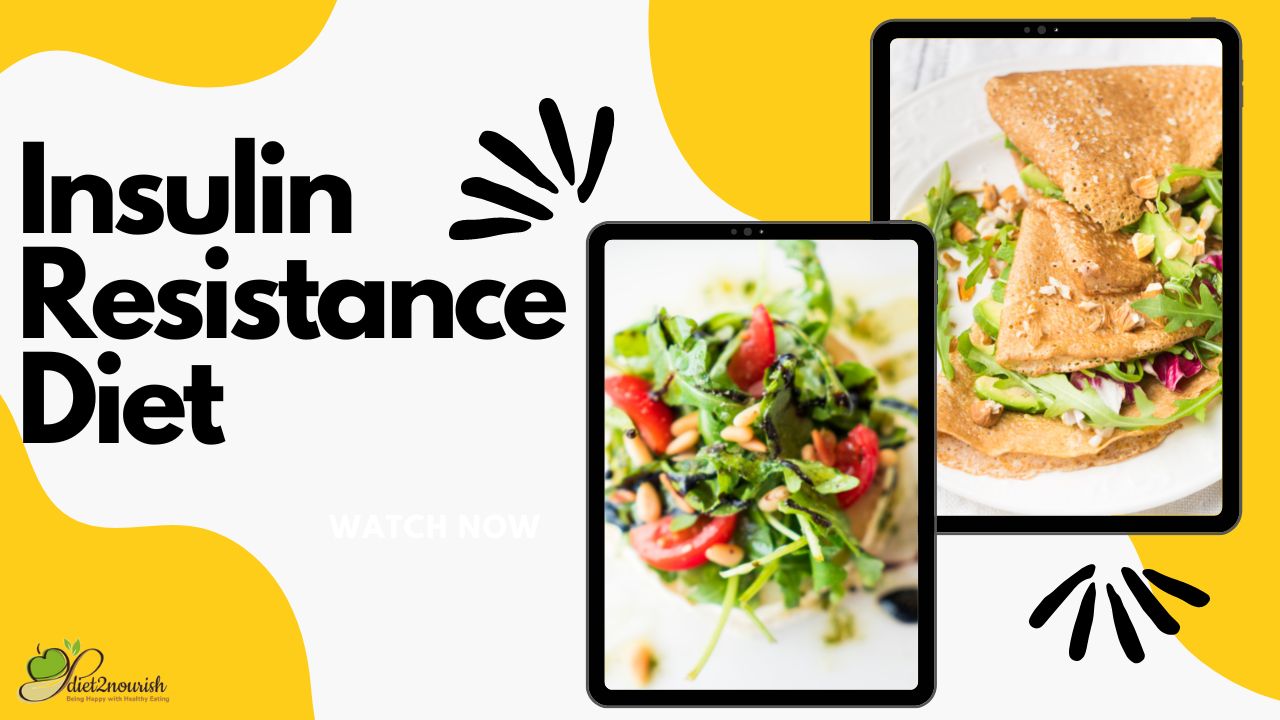Insulin Resistance Diet
Your body converts food into energy each day using the hormone insulin. Sometimes, an interruption in this process can result in insulin resistance, which raises blood sugar levels and may induce type 2 diabetes or prediabetes.
You must have often seen many people taking a dose of insulin for high blood sugar or diabetes. On the other hand, type 2 diabetes is caused by low insulin production or the body’s inability to use it properly. Today, we will talk about Insulin Resistance Diet so you can follow a healthy and wealthy lifestyle and get rid of blood pressure and Type 2 diabetes.
Insulin resistance: what is it?
To know about insulin resistance, first, you should know what does insulin mean? Insulin, a peptide hormone produced by the beta cells of the pancreatic islets, is considered the body’s main anabolic hormone. It helps in controlling the blood sugar level in your body. It is mainly proposed for those people who want to lose weight or are on the verge of getting affected by diabetes.
When your cells have trouble responding to insulin, this condition is known as insulin resistance, sometimes referred to as decreased insulin sensitivity.
Your body may attempt to compensate for a cell’s decreased response to insulin by producing more insulin. Glucose levels may remain under control if your pancreas can produce enough additional insulin to facilitate glucose entry into your cells.
What happens in insulin resistance?
Insulin resistance in a person can cause many health problems. These include type 2 diabetes, high blood pressure, and heart disease. In this situation, insulin is unable to do its job because the body opposes it. Glucose metabolizes poorly in the body, due to which a person gains weight. Long-term insensitivity to insulin from obesity causes other hormones to have trouble controlling blood sugar levels.
What are the Causes of Insulin Resistance?
The overproduction of insulin usually causes insulin resistance because of three main factors,
1. Obesity
2. Lack of exercise
3. Low fiber diet
This reduces insulin sensitivity in the body, and excessive insulin works to increase weight. Over time this makes insulin insensitivity worse than before, causing several problems. Studies suggest that cultural and genetic factors may increase the risk of insulin resistance. Apart from this, other lifestyle factors also seriously impact insulin resistance. However, incorporating healthy changes in the routine can help reduce the chances of type 2 diabetes.
Insulin resistance is linked to several risk factors, such as:
- an inheritance of diabetes
- a couch potato (not active) lifestyle
- Race (mainly if you are Black, Hispanic, or Native American) (especially if you are Black, Hispanic, or Native American)
- Age (the older you get, the more your risk increases) (the older you get, the more your risk increases)
- Hormones
- using steroids
- a few medications
- bad sleeping habits
- Smoking
PCOS Insulin Resistance Diet
Insulin levels in PCOS patients are frequently reported to be higher than usual. The pancreas is where the hormone insulin is made. It assists the body’s cells in converting sugar (glucose) into energy. Your blood sugar levels may increase if your body doesn’t create enough insulin. This can also occur if you have insulin resistance, preventing you from adequately using your insulin. Your body may try to produce excessive insulin if you have insulin resistance to maintain normal blood sugar levels. Your ovaries may create more androgens like testosterone if your insulin levels are too high.
A more incredible body mass index may also contribute to insulin resistance. People with PCOS frequently struggle with this problem due to insulin resistance, which can make weight loss more difficult.
PCOS is a complex problem; however, the good news is that PCOS can be easily managed with minor lifestyle adjustments, including an insulin resistance diet and exercise in your daily life. A diet rich in refined carbohydrates, such as starchy and sugary meals, might make it more difficult to control insulin resistance and, consequently, weight loss. Following our PCOS insulin resistance diet can help a lot to get rid of the issue.
How can Insulin Resistance Diet be a savior?
Consumption of an insulin resistance diet is the best option, which can affect insulin resistance. An Insulin Resistance Diet can positively affect insulin resistance. One way this could happen is if people overeat, which leads to weight gain. Exercising more by a person can reduce the effect of overeating. In addition, different types of food affect insulin resistance. Some foods for your Insulin Resistance Diet increase your risk, while others help lower it, so eat foods with a low glycemic index.
9 Foods to Include in the Insulin Resistance Diet
According to the American Diabetes Association, people with insulin resistance can eat various foods. However, they need to understand which foods increase the blood sugar level. Plus, which insulin-sensitizing nutrients do they contain?
In general, the foods listed below help maintain insulin sensitivity. It also lowers the risk of developing diabetes by:
1. Intake of Carbohydrates
Carbohydrates are one of the major sources of glucose, which makes up the sugar in our blood. Limiting carb intake to about 30 to 50 grams per day helps keep your blood sugar levels nice and stable without too many swings in energy levels.
2. Intake of Fiber
Fiber can slow down the digestion of carbohydrates so your blood sugar doesn’t spike. This means that the insulin levels in your body are more stable, which means you have less insulin resistance.
3. Importance of Protein
Protein is essential for all your bodily functions. So make sure it is lean sources like chicken breast, turkey, fish, etc. Doctors always recommend you include at least one protein shake daily. Protein shakes come in handy when you cannot get enough protein from a proper Insulin Resistance Diet.
4. Fruits are your best friends
Everyone likes to consume fruits, but they have a very high level of natural sugar. It interferes with the action of insulin, which can increase the level of sugar in your blood. This is especially seen if your fruit is ripe.
5. Vegetables are healthier than you think
Like fruits, whole vegetables are healthier than their juices. Juice lacks fiber, which makes us feel fuller and more satisfied. Therefore, you should limit your overall intake of fruit juice to 1 to 2 servings per day. So, make sure to eat plenty of vegetables every day. Darker vegetables mean more nutrients, so eat dark leafy vegetables like spinach, red or orange vegetables like carrots, and dark-colored vegetables like sweet potatoes or beets.
6. Must include Healthy Fats in your diet
Healthy fats are essential for the proper functioning of the body. It’s part of making hormones that help your body absorb the fat-soluble vitamins A, D, E, and K. They also support healthy brain function with omega 3 and reduce inflammation levels with omega 3.
7. Low-fat dairy products can fix your problem
Low-fat dairy products are a must in any insulin resistance diet plan. It makes you feel full while preventing the risk of developing type 2 diabetes.
8. Cereal you must add to your diet plan
You can have bread made from whole grains, but you should avoid eating pasta. However, you can have pasta made from whole grains. Cereals like oatmeal and Ezekiel need to be eaten at least twice daily with non-soy milk, as these cereals contain enzymes and amino acids.
9. Milk Thistle filters out excess estrogen
Milk thistle helps with liver function and filters out excess estrogen in the bloodstream, leading to insulin resistance. It also stimulates bile production in your body, which can help you with your digestive function.
Foods to Avoid during Insulin Resistance Diet
The following foods should be avoided or at least consumed to keep blood sugar levels under control:
- Sweetened drinks, including fruit juice, soda, and fountain drinks, contain a lot of sugar.
- In some circumstances, even small amounts of alcohol can cause serious harm.
- Starchy vegetables like sweet potatoes, yams (especially with the skin), pumpkin, and corn.
- More snacks and meals.
- Sweets with a lot of sugar, like cupcakes, ice cream, or chocolate bars.
- White bread, rice, pasta, and foods made with flour contain more carbohydrates than whole-grain varieties.
- Cow’s milk products, especially milk
- Avoiding deep-fried foods.
- Consider eating these over the holidays when you’re managing calories.
- Choose foods high in saturated fat, such as chocolate, butter, and salted pork.
Other ways to reduce insulin resistance
Get more sleep:
A good night’s sleep is vital to your health. If doctors are to be believed lack of sleep can make you prone to many diseases, including heart disease and type 2 diabetes. However, making up for insufficient sleep has fine-tuning consequences on insulin sensitivity.
Incorporating exercise into a lifestyle:
Regular exercise is the most effective way of improving insulin sensitivity. It helps enter sugar into the muscle cells, which leads to an increase in insulin sensitivity, which lasts from 2 to 48 hours, depending on the exercise.
Reducing stress:
Stress can reduce the body’s ability to control blood sugar. It promotes the production of stress hormones such as cortisol and glucagon. Meditation, exercise, and sleep minimize stress, and such activities can improve insulin sensitivity.
Lose excess weight:
Excess weight, especially in the abdominal region, lowers insulin sensitivity and increases the risk of type 2 diabetes. Hormones that promote insulin resistance in the muscle and liver can do so in several insulin-resistant ways. This includes making hormones that promote insulin resistance in the muscles and liver.
Conclusion
Insulin resistance can cause a number of health problems in a person. If you are insulin resistant, your condition can be improved with dietary changes and exercise. This article may help you to know about insulin resistance diet and essential things related to it. You can also connect with our dietitians and nutritionists to get a personalized insulin resistance diet chart.







